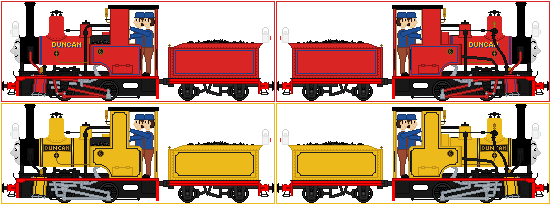HOME | DD
 Swiftwin4ds — GSWR 279 and 403
Swiftwin4ds — GSWR 279 and 403

Published: 2020-06-06 17:56:50 +0000 UTC; Views: 3864; Favourites: 39; Downloads: 51
Redirect to original
Description
Peter Drummond may not have been as famous as his older brother, Dugald, but he still turned out some interesting designs during his days as Chief Mechanical Engineer on the Glasgow and Southwestern Railway. The 279 Class 0-6-0 goods engine was one such engine, with 13 examples being built by North British in 1913. They were the heaviest British 0-6-0s until the LNER's J38 and J39s 13 years later Despite being powerful enough for the heavy goods work for which they were intended, they were known for being slow climbers, had rather high fuel consumption, and were prone to a host of mechanical failures, particularly crankpins, as well as being unpopular with footplatemen due to their being accustomed to driving right-handed engines, whereas the 279s were left-hand drive. Their performance was so poor that the company paid a six pence bonus per single trip to crews assigned to these engines from Glasgow to Carlisle that did not did not suffer a failure on at least three quarters of the journey. It was for this reason that Drummond then developed an improved version of the 279 class in 1916, known as the 403which were built as 2-6-0s and had superheaters fitted, with 11 built by North British that same year. The 403 Class was an improvement in most other aspects except for the slow climbing speed. They were known as "Austrian Goods" due to a rumor circulating that they were built by North British for a contract with Austria which was cancelled with the outbreak of World War I. The 13 279s, renumbered to become the 71 Class, and the 11 403s, now the 51 class, were all taken into LMS stock, where they were gradually replaced by group standard designs such as Hughes Crab 2-6-0s and eeked out their existence in parts of Scotland. The 279s were all withdrawn between 1930 and 33, while the 403s survived a little longer to become the last surviving GSWR tender locomotives, with the last of them being scrapped in 1947. No examples of either class survive in preservation today.Related content
Comments: 3

👍: 0 ⏩: 2

👍: 0 ⏩: 0

👍: 1 ⏩: 0




















